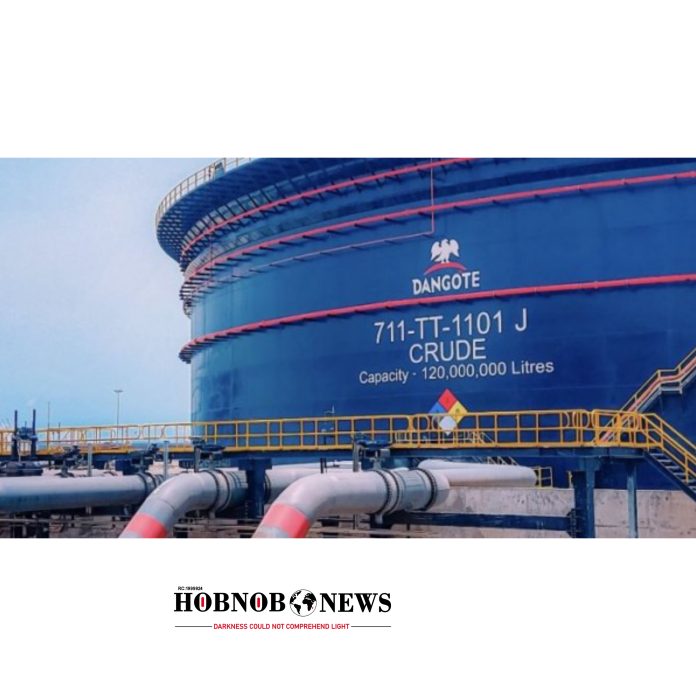The Publicity Secretary of the Crude Oil Refiners Association of Nigeria (CORAN), Eche Idoko, has questioned the continued approval of Premium Motor Spirit (PMS) importation licenses by the Nigeria Midstream and Downstream Petroleum Regulatory Authority (NMDPRA).
Speaking exclusively with Nairametrics, Idoko revealed that the Dangote Petroleum Refinery currently holds 500 million litres of PMS in stock as of Thursday, February 20.
According to Nairametrics, Ogbugo Ukoha, the Executive Director of Distribution Systems, Storage, and Retailing Infrastructure at NMDPRA, stated that Nigeria consumes approximately 50 million litres of PMS daily. He further argued that local refineries are unable to supply even 50% of the national demand.
Due to this shortfall, Ukoha explained that the regulatory agency needed to issue import licenses to oil marketers to prevent fuel shortages.
However, Idoko disagreed with this assertion, arguing that the Dangote refinery’s current PMS stock alone could meet local consumption for 10 days. He also pointed out that other modular refineries across the country further contribute to the supply.
> “I find that submission by NMDPRA rather curious. As we speak, Dangote has in stock 500 million litres of PMS in stock. That’s their production stock for 10 days, and it hasn’t been depleted. You know, I mentioned to you that in December, they were almost having a tank-top situation. So, I don’t understand why there’s a need to give licenses for importation when we have 500 million litres from only one refinery.”
> “That’s about 940 metric tonnes vessels available for take-up,” he said.
Dangote’s PMS is Cheaper
Idoko also emphasized that Dangote’s petrol is more affordable than the Nigeria National Petroleum Company Limited (NNPCL)’s product.
He argued that since locally refined PMS is cheaper, the NMDPRA has no valid reason to allow further importation, considering the country’s local content policies and backward integration strategies.
> “Why won’t the marketers or whosoever is importing simply go to Dangote and pick that when we have seen empirically that the Dangote product is cheaper? Because right now, MRS that is getting from Dangote, is selling cheaper than NNPC. So, there’s nothing to justify importation of petroleum products as per the provisions of the PIA and the requirements for backward integration.”
Legal Dispute Over Importation
A legal battle is currently ongoing between the Dangote Petroleum Refinery and Petrochemicals FZE, NNPCL, and NMDPRA.
Nairametrics reported that Dangote Refinery filed a lawsuit at the Federal High Court in Abuja to invalidate the import licenses issued to NNPCL, Matrix Petroleum Services Limited, A.A. Rano Limited, and four other companies.
In suit number FHC/ABJ/CS/1324/2024, Dangote Refinery is seeking N100 billion in damages against NMDPRA for issuing import licenses to NNPCL, Matrix, and others to import Automotive Gas Oil (AGO) and Jet Fuel (aviation turbine fuel).
Dangote argues that its refinery produces sufficient PMS, AGO, and other petroleum products to meet local demand without shortages.
Although NNPCL has denied importing refined petroleum products, the NMDPRA has confirmed that it granted licenses to some oil marketers.
Challenges Facing Private Refineries in Nigeria
In previous years, Nigeria produced over 2 million barrels of crude oil daily but lacked significant refining capacity, leading to the export of crude oil and importation of refined products.
Today, the country has the world’s largest single-train refinery with a 650,000 barrels per day refining capacity, along with several modular refineries refining between 1,000 and 5,000 barrels per day.
However, Nigeria struggles to provide adequate crude oil supply to these private refineries, forcing them to import crude oil and deal with exchange rate volatility.
Reports indicate that the crude-for-Naira initiative designed to ensure local refineries receive crude oil has been inconsistently implemented. As a result, local refineries must import crude oil and, when purchasing locally, sometimes pay in U.S. dollars.
It has been reported that Dangote refinery is importing crude oil from the United States and is also constructing new storage facilities to ensure a steady feedstock supply.
With the continued importation of refined petroleum products and local refineries struggling to secure crude oil in Naira, experts argue that Nigerians are now more vulnerable to global oil price fluctuations—a concerning situation for a major oil-producing nation.

